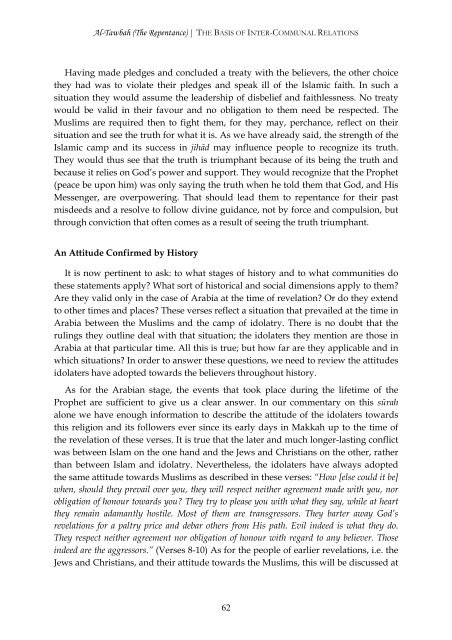Volume 8 Surah 9 - Enjoy Islam
Volume 8 Surah 9 - Enjoy Islam
Volume 8 Surah 9 - Enjoy Islam
- No tags were found...
Create successful ePaper yourself
Turn your PDF publications into a flip-book with our unique Google optimized e-Paper software.
Al-Tawbah (The Repentance) | THE BASIS OF INTER-COMMUNAL RELATIONSHaving made pledges and concluded a treaty with the believers, the other choicethey had was to violate their pledges and speak ill of the <strong>Islam</strong>ic faith. In such asituation they would assume the leadership of disbelief and faithlessness. No treatywould be valid in their favour and no obligation to them need be respected. TheMuslims are required then to fight them, for they may, perchance, reflect on theirsituation and see the truth for what it is. As we have already said, the strength of the<strong>Islam</strong>ic camp and its success in jihād may influence people to recognize its truth.They would thus see that the truth is triumphant because of its being the truth andbecause it relies on God’s power and support. They would recognize that the Prophet(peace be upon him) was only saying the truth when he told them that God, and HisMessenger, are overpowering. That should lead them to repentance for their pastmisdeeds and a resolve to follow divine guidance, not by force and compulsion, butthrough conviction that often comes as a result of seeing the truth triumphant.An Attitude Confirmed by HistoryIt is now pertinent to ask: to what stages of history and to what communities dothese statements apply? What sort of historical and social dimensions apply to them?Are they valid only in the case of Arabia at the time of revelation? Or do they extendto other times and places? These verses reflect a situation that prevailed at the time inArabia between the Muslims and the camp of idolatry. There is no doubt that therulings they outline deal with that situation; the idolaters they mention are those inArabia at that particular time. All this is true; but how far are they applicable and inwhich situations? In order to answer these questions, we need to review the attitudesidolaters have adopted towards the believers throughout history.As for the Arabian stage, the events that took place during the lifetime of theProphet are sufficient to give us a clear answer. In our commentary on this sūrahalone we have enough information to describe the attitude of the idolaters towardsthis religion and its followers ever since its early days in Makkah up to the time ofthe revelation of these verses. It is true that the later and much longer-lasting conflictwas between <strong>Islam</strong> on the one hand and the Jews and Christians on the other, ratherthan between <strong>Islam</strong> and idolatry. Nevertheless, the idolaters have always adoptedthe same attitude towards Muslims as described in these verses: “How [else could it be]when, should they prevail over you, they will respect neither agreement made with you, norobligation of honour towards you? They try to please you with what they say, while at heartthey remain adamantly hostile. Most of them are transgressors. They barter away God’srevelations for a paltry price and debar others from His path. Evil indeed is what they do.They respect neither agreement nor obligation of honour with regard to any believer. Thoseindeed are the aggressors.” (Verses 8-10) As for the people of earlier revelations, i.e. theJews and Christians, and their attitude towards the Muslims, this will be discussed at62
















